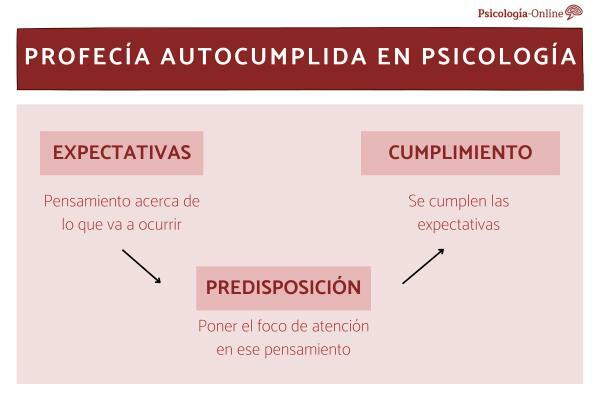
Self-fulfilling prophecy is a psychological phenomenon through which we turn anticipated expectations into reality in a given situation. It is not so much a question of guessing what is going to happen as of unconsciously provoking it out of the firm belief that it is going to happen.
In the following Psychology-Online article, we will analyze what is self-fulfilling prophecy in psychology, we will talk about the factors that condition it, we will expose the vicious circle to which the people who put it into practice are subjected and we will propose different tools that allow us, on the one hand, to take advantage of the advantages and, on the other, to free ourselves from the negative consequences when using this phenomenon in our life.
Index
- What is a self-fulfilling prophecy
- Factors that condition self-fulfilling prophecy
- Consequences of self-fulfilling prophecy
- How to avoid self-fulfilling prophecy in psychology
What is a self-fulfilling prophecy.
Self-fulfilling prophecy is a psychological phenomenon that was initially studied by sociologist Robert King Merton. He defined it as a false definition of a situation or person that evokes a new behavior, which makes the false conception true.
How to make a self-fulfilling prophecy? The process through which this occurs is as follows:
- A person, faced with a certain situation, generates certain expectations about what is going to happen.
- Those same expectations predispose to react with respect to said result.
- In this way, on a more or less unconscious level, his gaze, his attitude, his emotions, his physical reactions and his final behavior will be consistent with those expectations, reinforcing them.
- It then happens that the person, with his own action, encourages the achievement of the imagined situation.
In the words of Merton, "eThis misleading validity perpetuates error" to be the person himself the one that, without realizing it, provokes the anticipated situation. The author concludes that the holder of the false belief will perceive the course of events as proof that he was right. from the beginning, hardly aware that it was his own way of acting that led him to provoke the situation.
Examples of self-fulfilling prophecy
This phenomenon occurs both individually and socially and with both positive and negative effects. Some examples of self-fulfilling prophecy would be:
- Thinking that a job interview is not going to go well for us and, indeed, it does not go well for us.
- When we think we are going to fall and eventually we fall.
- If we believe that we are good at something and we complete the task perfectly; when we venture that something is going to go wrong and ends up going wrong.
- When we believe we deserve affection and, consequently, we have people around who take care of us.
Factors that condition the self-fulfilling prophecy.
The main factor conditioning self-fulfilling prophecy is the thought. The concrete content of the thought that we have will determine our emotions and physical, motor, verbal and non-verbal acts. In turn, the kind of thinking we have, they will come conditioned by internal mental schemas that we have built on ourselves, on others and on the world.
If we take into account that the construction of these mental schemes begins already in early childhood based on the experiences that occur in our lives, we must consider these life events as prime factors in determining future self-fulfilling prophecies.
Consequences of self-fulfilling prophecy.
The main consequence of self-fulfilling prophecy is the occurrence of the mentally anticipated situation. As previously mentioned, this occurs both in the face of positive expectations and when we feel capable of pass a test, such as negative, for example, when we believe that our partner is going to leave us and, finally, we let.
Let's see what are the types of consequences of self-fulfilling prophecy depending on whether The expectations are positive or negative:
- Positive prophecies: in positive cases, the consequences are a strengthening of confidence in certain aspects of oneself.
- Negative prophecies: they constitute a large slab on people with depressive and negative thoughts that do not They allow us to get out of the vicious circle that implies confirming, with the results, negative beliefs originals. In this article, we tell you how to eliminate negative thoughts.
How to avoid self-fulfilling prophecy in psychology.
The self-fulfilling prophecy it occurs in a good part of the situations of our life and, as has been commented, it is due to the influence that our thoughts have on our emotional reactions, physical and behavioral, which end up directing us in one direction or another depending on the content of our thoughts.
To avoid a self-fulfilling prophecy, the best way to approach it and heal is with the strength of the mind. In reality, this fact supposes a phenomenon of great relevance for psychotherapeutic intervention insofar as it allows, by working with the core cognitions and beliefs, eliminate negative self-fulfilling prophecies and encourage personal empowerment, increasing prophecies positive.
A concrete way to heal self-fulfilling prophecy in psychotherapy would be the following:
- Conduct an introspection process: a deep analysis that helps us to specify the core beliefs that are at the base of our thoughts.
- Become aware of how these beliefs influence: its effect on each of our emotions and actions.
- Check the veracity of these beliefs and commit to two actions: eliminate irrational and false beliefs that hinder our lives and create and strengthen more realistic and positive beliefs that allow us to trust our own talent and potential.
Awareness of the functioning of self-fulfilling prophecy is a valuable tool for the emotional self-management and personal growth.
This article is merely informative, in Psychology-Online we do not have the power to make a diagnosis or recommend a treatment. We invite you to go to a psychologist to treat your particular case.
If you want to read more articles similar to What is Self-Fulfilling Prophecy in Psychology, we recommend that you enter our category of Cognitive psychology.
Bibliography
- Barret, L.F. and Gross, J.J. (2001). Emotional Intelligence. A process model of emotion representation and regulation. In T. J. Mayne and G.A.
- Bonano (Eds.). Emotions. Current issues and future directions. New York: The Guilford Press Bonano, G.A. (2001). Emotion self-regulation. In T. J. Mayne and G.A. Bonano (Eds.). Emotions. Current issues and future directions. New York: The Guilford Press.
- Higgins, E.T., Grant, H. And Shah, J. (1999). Seft Regulation and quality of life: Emotional and non-emotional life experiences. In Kahneman, Diener and Schwarz (Eds.). Well-being: the foundations of hedonic psychology. New York: Russell Sage Foundation


